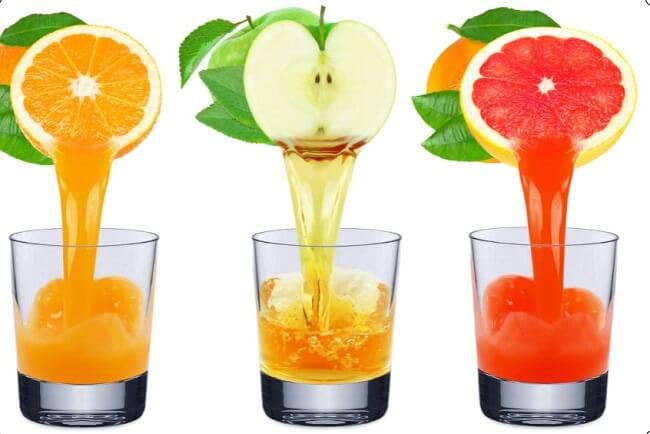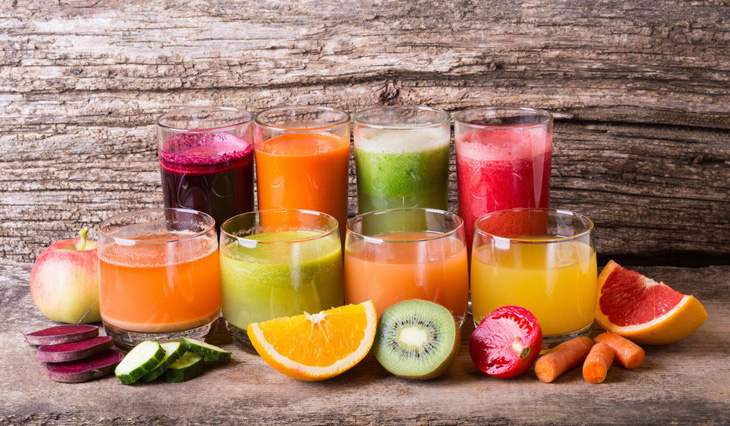Many people choose fruit juice as a convenient way to supplement their daily vitamin and fiber intake. But is fruit juice really good for your health?

Many people choose fruit juice as a convenient way to supplement vitamins and fiber every day - Photo: National Institute of Nutrition
The benefits of fruit for the body.
According to Ms. Ngo Thi Ha Phuong (Center for Nutrition Education and Communication, National Institute of Nutrition), fruit is an indispensable food in daily meals.
Fruits provide various vitamins, fiber, and antioxidants. Vitamins found in fruits include vitamin C, which helps prevent infections, fight inflammation, combat aging, and boost immunity; and provitamin A (beta-carotene), which offers numerous benefits for epithelial integrity, vision, growth, and development.
The recommended daily intake of fruit is an average of 240g for adults, 300g for children aged 6-11, and approximately 240g for children aged 3-5 (according to the balanced nutrition pyramid for Vietnamese people, National Institute of Nutrition).
It is recommended that fruits be consumed in their whole form (segments or pieces) so that the body can fully access the fiber, vitamins, and antioxidants.
What types of fruit juices are there?
Fruit juices can be divided into three types: whole fruit, fresh fruit juice, and industrially produced fruit juice.
Whole fruit (pieces, segments) means not being crushed or blended; fresh fruit juice (either pressed or blended) is ready to drink; and fruit juice produced using advanced technology has a longer shelf life.
Essentially, all three forms contain the natural sugars found in fruits: fructose (also known as fruit sugar), a simple monosaccharide that is absorbed directly into the bloodstream during digestion, and natural glucose.
The sugars in fruits exist in two forms: fructose and glucose, unlike white sugar, also known as sucrose (although sucrose's structure consists of fructose and glucose).
Whole fruits contain sugars within their cells, which are not classified as free sugars; fruit juices (both fresh and commercially produced) contain sugars in an extracellular form (classified as free sugars).
However, the difference is that with commercially produced fruit juices (except for 100% pure varieties), in addition to the naturally occurring fruit sugars, other free sugars (usually sucrose, which is inexpensive) are added to increase sweetness and preserve the product.
Adding whole fruits to the diet may reduce markers of systemic inflammation, blood pressure, and body mass, and, when used as a replacement, may improve markers of glycemic control.
Therefore, in terms of metabolic cardiovascular health, whole fruits can consistently and reliably improve markers of metabolic cardiovascular health and are the cornerstone of a healthy diet.
Fruit juice is not recommended as a substitute for whole fruit.
How much fruit juice should you drink?
Research findings indicate that consuming 100% fruit juice is associated with weight gain in children, particularly young children. Furthermore, the lack of fiber in fruit juice compared to whole fruit may lead to reduced satiety and overconsumption of these beverages.
Specifically for children, studies have shown that giving them fruit juice at an early age can lead to an increased risk of overweight and obesity because children tend to prefer sweets.
Nutritional advice from some countries around the world limits fruit juice consumption to no more than 150ml per day (UK) or restricts fruit juice consumption to once a day, drunk with meals, and always choosing unsweetened varieties (Ireland).
Thus, it can be seen that the main concern when comparing different types of fruit juices today is largely related to the forms of "sugar" in the fruit.
The advice is to limit your consumption of fruit or vegetable juices and smoothies to a total of 150ml per day (one serving). This includes even unsweetened varieties, which should be limited.
Drink fruit juices and smoothies at mealtimes to reduce the impact on your teeth. Limit your fruit juice consumption to prevent excess calories and weight gain.
The important thing to remember is that we consume food as a whole, not individual substances; therefore, the form of food is crucial.
Therefore, it is recommended to consume whole fruits in slices or pieces, limit fruit juice intake to no more than 150ml per day, and avoid commercially produced fruit juices with added sugar.
 Use fruit juice for children.
Use fruit juice for children.Source: https://tuoitre.vn/nuoc-ep-trai-cay-dang-nao-tot-cho-suc-khoe-hon-20250120160639711.htm













































































































Comment (0)